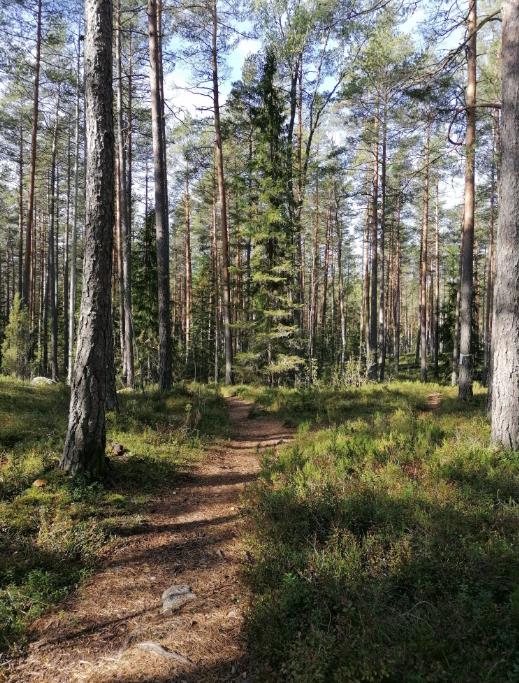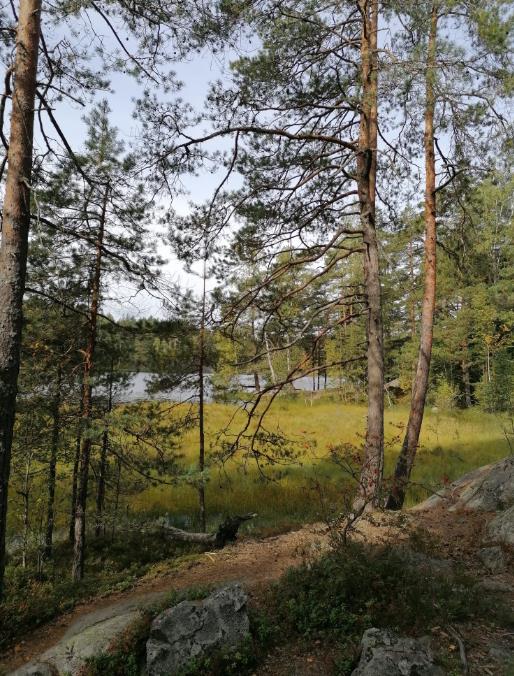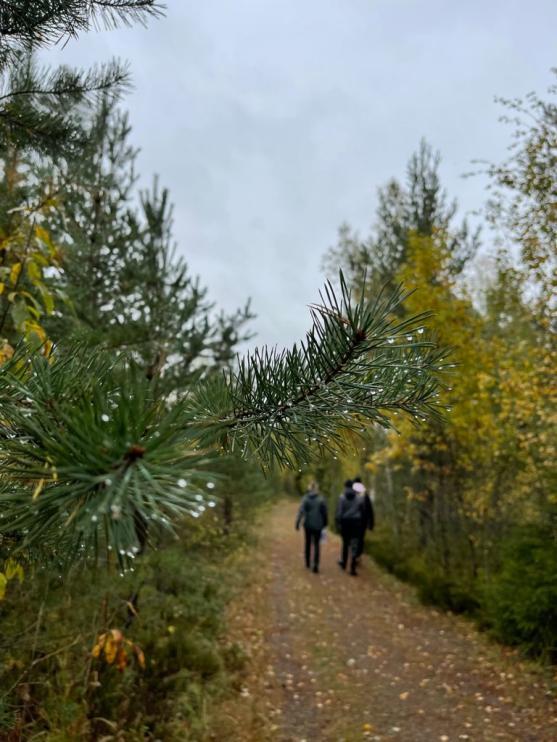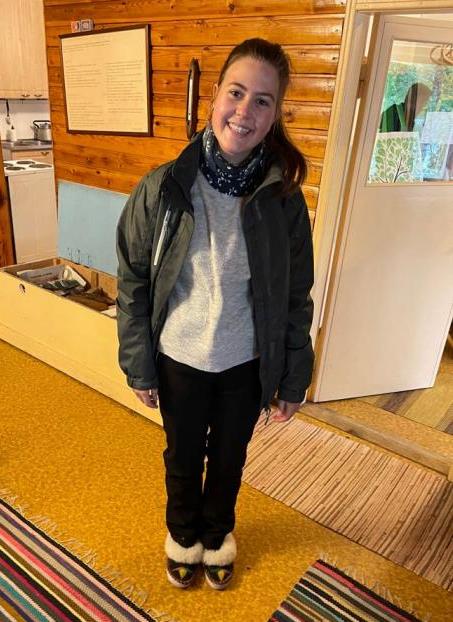Written by Lisa Stögbuchner
Introduction
In my learning diary, I would like to summarise and record my insights, experiences, and thoughts from the course “Nature as a support for well-being and studies”.


My initial thought on the subject
I have always enjoyed being in nature, at home in the garden or the forest, on my own, or with others. Whether as a child, during different ages and schools, after moving to the city, during Covid19, or here in my semester abroad in Finland. Some of the reasons for going into nature have changed over the years, but some have remained the same. By that, I mean the feeling of freedom, well-being, and being welcomed. For me, nature offers an unbelievable treasure of positive aspects that one should always bear in mind and use more consciously. This is a finding and a personal insight I will take from our course and our activities.
My first professional point of view as a future social worker
The content of the course was far from theoretical inputs and units. Rather, it was about gaining insight into the possibilities of nature activities through self-experience. This took place in the form of individual and group tasks, sometimes guided, sometimes prepared by the participants themselves. Especially during the preparation of our group nature activity, I became aware again that nature offers many possibilities to be used, but also requires a lot of planning. The latter refers to the challenges and hurdles when working with different clients and client groups. This also means that it requires enough preparation and above all empathy and sensitivity to the experience and culture of others.
Social Inclusion in outdoor activities
To understand the impact of outdoor activities on individuals, we should reflect on the following three components: “self, others and the natural environment” (Hopkins and Putnam 1993, cited in Brodin 2009, 100). It is a combination of the individuals, with all their past experiences, the group, consisting of different characteristics and affected by different dynamics, and the natural environment, which provides space for getting new experiences on your own, as part of the group and related to what nature provides.

The term “Inclusion” and the meaning for professionals
When we work with clients it is always important to pick them up where they are. You have to be sensitive to their perspective, experiences, stories, and backgrounds. They have different levels of experiences in nature. As Hayes (2014, 44) mentions: “outdoor adventures […] are a good way of encouraging us to explore together, to discover new things about ourselves as well as others and to make new connections.” Therefore, we have to make sure to convey the feeling of being able and wanting to participate to our clients. The offer should be low-threshold enough, to encourage them to take their chance and join (Hayes 2014, 43-44). When it comes to providing a program for clients, we often feel the pressure of offering a lot of different and varied activities, to avoid boredom and the chance of losing their interest. But that is not, what it should be about. We should try to enable the clients, to be themselves, find them in their new surroundings. When giving a name to an activity or explaining the aim, why we are doing it, we already influence the opinion of the client, restrict the individual process and exclude them before they are even taking part (Hayes 2014, 45-46).
For me, Hayes (2014, 46) makes aware of a very important thing, when she says, that we, as professionals, offer outdoor activities, already decide who we include or exclude in the program, even if we don’t do this on purpose. The point of offering an inclusive program is a topic, which I will think about more specifically in the future or for my work as well.
Inclusion in practice
“Generally, inclusion means to be a natural part of, for instance, a group, class or community, accessibility to activities, participation and equal opportunities” (Brodin 2009, 100). In general, this sounds quite easy, doesn’t it? Just make sure, everyone can take part regarding their abilities. This can’t be that difficult. Wrong – of course, it is not that simple, otherwise, it wouldn’t be part of the discussions in the social care sector all the time. To point out what I mean, I want to mention one example from the workshop I attended at the beginning of the course in September.
The topic of the day was “Social Inclusion in outdoor activities”. We were split into groups of 4 and told to follow the marked path in the map, which we got from the teachers. The map showed us small stations, where we could try out different nature activities. They were supposed to be both, individual and group tasks or at least reflected in the group, after doing it individually. One of our teammates had an artificial leg, which didn’t handicap him during the tasks. The only time when we got aware of the borders of his ability to participate was when we had to search the task station up on a hill because we had to climb a bit. He was not able to come with us, but he wanted our team to check out the point and not skip it, as we offered to do. So, we decided together with him, that we will get the task, while he was waiting, and bring it with us to do it together as the whole team.
For me, it’s really important to mention this occasion, because I had to think about it a lot afterward. I was confused by the title of the workshop, telling me something about inclusion, and then the activity itself which, at the first sight, excluded one of our team members. After reflecting on this situation more intensely, my point of view is more positive now. The reason for that is, that I now understand, that inclusion is not just about being able to take part in a certain activity, it is about the individual learning process, which is possible, even if you have to be more creative to solve a task, or find a solution together with your team, which can give you the feeling of being included as well. So, everyone else also gets the chance to learn what it means to include others and be sensitive to what they can do.
Positive aspects of nature activities for our clients
Setting
Positive aspects for clients already start when thinking about the surrounding. To provoke “recovery”, the setting should provide “fascination”, “being away”, “extent” and “compatibility” (Herzog and Strevey 2008, 749). Fascination is part of the design of the activity. Being away means for clients to get out of their normal surroundings, which are most of the time afflicted with problems. They come to a new area, where they can explore new things or things they usually don’t recognize in their daily surrounding. Compatibility is more about the authenticity of the setting, which makes everything fit together without the feeling of something strange or unsuitable (Herzog and Strevey 2008, 749).
Different client groups
What are special skills our clients can earn from the nature activities then? Hopkins and Putnam (1993), cited in Brodin (2009, 100-101), mention the terms “leadership, team-building and problem-solving”. Consequently, the aim of doing outdoor education or activities can be very different according to each participant. For children, most of the experiences they make are new and provide a lot of new learnings and objectives (Brodin 2009, 100). Furthermore, children benefit in form of “[…] affective, cognitive, and moral development” (Chaudhury and Banerjee 2020, table 2). By comparison, for adults, many activities can relate to experiences they made in the past (Brodin 2009, 100). Further detectable positive effects of nature experiences were for example found for people with “dementia”, “ADHD”, “Post-traumatic Stress Disorder” or people with “Substance Abuse” (Chaudhury and Banerjee 2020, table 2).
Health
Nature has positive effects on our physical health, mental and social well-being, and a healthier lifestyle. Being in nature can reduce stress levels and depressions, improve blood pressure, make people move, and of course have an impact on social behavior (Shaharan 2016, Introduction). I for myself can completely agree with those points. I use nature a lot for doing physical activities like hiking, especially to reduce stress and clear my thoughts. When thinking about Social Work clients, many of them are under high pressure and feel stress in different kinds. Therefore, nature can be helpful to build a setting, where they can reduce stress, have clearer minds, and start working together to solve their problems. As the studies of Herzog and Strevey (2008, 748) show, stress can be limited in places that “[…] evoke moderate levels of interest, pleasantness, and calm”. Improvement of “Well-being” and “life satisfaction” include also “vitality”, “improvement of family functionality”, having a longer life and a “lower risk of mental illness” (Chaudhury and Banerjee 2020, table 2).
If you think about that more specifically, those are incredible chances to change something in our clients’ lives. They often live in a multi-problematic situation, not knowing where to start. Nature can have a huge impact on our well-being in many different ways, we just need to use it the right way, to get the best out of it.
Conclusion
Of course, there were a lot more learning outcomes during the course. Regarding the length of this work, I just mentioned the most relevant ones for me in my future work. Concerning the title of my work, I would say, nature is an “allrounder” when it comes to positive effects on people, the chances of activities provided, the accessibility for everyone (at least with a bit of help and support), and the feelings and emotions you can explore there. All those things mentioned above, are an incredible treasure which we should use and share with others, to give them the chance to benefit from what nature provides as well! Same as we got the chance to learn all of that during our course.
Furthermore, I want to say that I am really thankful for having the chance to attend this course with so many amazing people, getting them to know, preparing and working together, and experiencing a lot of new things and adventures as part of the group.

References
- Brodin, Jane (2009). Inclusion through access to outdoor education: Learning in Motion (LIM). Journal of Adventure Education and Outdoor Learning. 9. 99-113. 10.1080/14729670903004340. Accessed 15.10.2021.
https://www.researchgate.net/publication/232950580_Inclusion_through_access_to_outdoor_education_Learning_in_Motion_LIM - Chaudhury, P., and Banerjee, D. (2020). “Recovering With Nature”: A Review of Ecotherapy and Implications for the COVID-19 Pandemic. Frontiers in public health, 8, 604440.
https://doi.org/10.3389/fpubh.2020.604440. Accessed 16.10.2021.
https://www.ncbi.nlm.nih.gov/pmc/articles/PMC7758313/pdf/fpubh-08-604440.pdf - Hayes, Tracy (2014). The challenges of social inclusion in outdoor education: can tortoise and hare learn together? In: Being there: Slow, fast, traditional, wild, urban, natural… 2013 Adventure Conference, 21-23 May 2013, Sabhal Mòr Ostaig, Isle of Skye, UK. Downloaded from: http://insight.cumbria.ac.uk/id/eprint/2411/ Accessed 15.10.2021.
https://insight.cumbria.ac.uk/id/eprint/2411/1/2013%20Adventure%20Conference%20Proceedings.pdf - Herzog, T. R., Strevey, S. J. (2008). Contact With Nature, Sense of Humor, and Psychological Well-Being, Environment and Behavior, 40(6), pp. 747–776. doi: 10.1177/0013916507308524. Accessed 16.10.2021.
https://journals.sagepub.com/doi/pdf/10.1177/0013916507308524 - Shanahan, D. F., Bush, R. Gaston, K, et al. (23 June 2016). Health Benefits from Nature Experiences Depend on Dose. Sci. Rep. 6, 28551; doi: 10.1038/srep28551 (2016). Accessed 16.10.2021.
https://www.nature.com/articles/srep28551#citeas
Suurin osa Showcasen blogeista on toteutettu osana Laurean opintojaksoja. Koko koulutustarjontaamme voi tutustua nettisivuillamme. Tarjoamme kymmenien tutkintoon johtavien koulutuksien lisäksi myös paljon täydennys- ja erikoistumiskoulutuksia sekä yksittäisiä opintojaksoja avoimen AMK:n kautta!